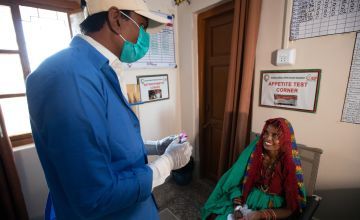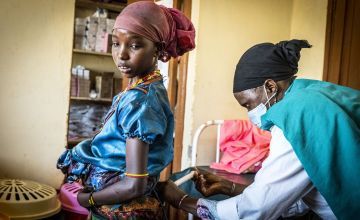
Knowledge Hub
Healthcare is considered a human right and marked each year on World Health Day. The World Health Organization specifically states ‘acceptability’ and ‘sensitivity to gender’ as a core component to the right to health. Yet, it has been proven that the 3.8 billion women worldwide cannot expect the same standard as their male counterparts.
We talk about health as an umbrella term encompassing the population, when in fact in a world designed for men, a person’s physical / mental condition is heavily influenced by gender. There is a profound gender data gap in healthcare as the data society collects is typically about men’s experience, not women’s and that has long term consequences.
In health research women are excluded from medical trials, resulting in the manufacture of drugs that are not always compatible with a woman’s unique biological make up. These may not only be less effective for women but are actually potentially harmful.
Pain bias is also a health inequality rarely discussed. When handling pain men and women are treated differently and a woman’s pain is routinely underestimated leading to misdiagnosis and lethal consequences.
Uniting the ‘atypical’ across the world
Aristotle referred to the female as a “mutilated male”. Although quoting from BC times may seem outdated, the notion of a male being the standard and therefore superior human being remains entrenched in the modern day.
Women worldwide have reported being ‘medically gaslighted’ into believing their symptoms aren’t real due to a lack of understanding about sex differences, evidenced by the fact that women are 50 percent more likely to be misdiagnosed after a heart attack (according to Leeds University researchers).
The everyday objects we all use, down to seatbelts in cars, are not primarily designed for the female form (women are 17 percent more likely than men to die if they’re in a car crash). The UK Health Secretary has even recently acknowledged the existence of such disparities by launching an enquiry into gender bias in medical equipment.
Another key life event affecting half the population which is only just beginning to receive a level of recognition is menopause. Combining two prime societal taboos -women’s reproductive health and ageing - women experiencing menopause/perimenopause have long suffered debilitating symptoms and a lack of support from healthcare services. Until recently menopause was not an obligatory part of medical school training in the UK and it is still missing from countless curriculums globally (a 2021 study found 41% of medical schools surveyed did not have a menopause training program for their students). Menopause also has a huge economic impact in terms of lost productivity at what is considered career peak for many women, due to a lack of employer understanding and the absence of policy.
Navigating underdeveloped healthcare systems

However, it’s important to acknowledge that privilege exists, as for women in developing contexts the situation is greatly escalated. Access to quality healthcare is particularly challenging as health systems in low- and middle-income nations are overwhelmed and lacking in necessary infrastructure and resource, partly attributed to a lack of inclusion on the global stage.
Particular conditions are more pronounced in this context. For example, there are much higher rates of cancer in low/middle income countries - over 50% of deaths from breast cancer and 88% of deaths from cervical cancer occur in less developed regions. This is further exacerbated when you factor in the impact on health in conflict situations from displaced populations, heightened disease transmission to the breakdown of services.

For women living in extreme poverty additional burdens such as access to food and nutritional diversity pile on the likelihood of poor health. When applying this to maternal health it is further jeopardized for both mother and infant and should be treated with a human rights-based approach. It’s said that 99% of all maternal deaths occur in low- and middle-income countries.
These are largely preventable and the situation for new mothers can be improved. Concern Worldwide operates many antenatal care facilities, such as Korogocho Health Centre in Nairobi. This centre has a target population of 40,000 and sees 70 visitors a day on average who receive regular, lifesaving check-ups for newborns and the provision of necessary supplements.
Concern Worldwide’s programme in Liberia, specifically Yeabloe town, district #4 Grand Bassa County, highlights simple solutions to empower vulnerable women through mother support groups. Offering the tools for integrated nutrition sensitive interventions to improve health outcomes for children under five – one mother created ‘sack gardens’ to grow vegetables for her family
A snapshot of sexual and reproductive health

It’s been said that medicine sees women first and foremost as reproductive bodies. Yet sexual and reproductive health remains underfunded with poor quality services available, child marriage and harrowing procedures such as female genital mutilation occurring to this day.
Sexually transmitted diseases such as HIV/AIDS disproportionately affect women - women account for more than half the number of people living with HIV worldwide. In certain countries such as Uganda the prevalence of HIV in women is nearly double that of men (statistic from Uganda AIDS Commission). Concern Worldwide’s work aims to help reduce new HIV infections, as well as minimize the impact post transmission among people living in extreme poverty. This is done by mainstreaming responses in all sector programs and working in partnership with national government efforts within host countries. For example, in Chad the focus is on sensitization and education on HIV via the installation of mobile clinics offering free and voluntary testing especially to pregnant women seeking antenatal consultations. Find out more here.
Calling female leaders

There is an urgent need to increase the number of women in healthcare leadership roles, particularly in developing nations, to change this tide. Worldwide, women fill only 25% of senior and 5% of top health organisation positions. Only 5% of these are women from low- or middle-income countries. It was only recent history that saw figures such as Elizabeth Abimbola Awoliyi, the first female medical doctor in Nigeria, rise up. Women are not only more likely to be aware of female-specific needs, but also male and pediatric health signs because of their role in family health. That will ultimately transform the research being carried out and shape the future of healthcare.
Organisations such as Women in Global Health (WGH) have emerged, working to promote gender equality in global health leadership. Roopa Dhatt, Executive Director of WGH summed it up stating “Imagine if the leadership in global health reflected the communities global health aims to reach, how much more in tune and effective we could be?”
Achieving gender inclusive health
Although a turbulent picture, achieving equal and gender-responsive health is possible. We must develop the gender analytical frameworks that recognise the diversity of roles that women play in the changing global/social order that impact their health. This is in addition to driving the inclusion of female representatives as decision-makers from all contexts, particularly amplifying the voices of those in developing countries.
Crises such as the Covid-19 pandemic and the climate crisis have shown starkly that a global approach is needed and the lessons learnt must be taken forward and applied here. There are simply no winners without a global outlook.
Continue the conversation by following us on LinkedIn.
Other ways to help
Donate now
Give a one-off, or a monthly, donation today.
Join an event
From mountain trekking to marathon running, join us for one of our many exciting outdoor events!
Buy a gift
With an extensive range of alternative gifts, we have something to suit everybody.
Leave a gift in your will
Leave the world a better place with a life-changing legacy.
Become a corporate supporter
We partner with a range of organisations that share our passion and the results have been fantastic.
Create your own fundraising event
Raise money for Concern by organising your own charity fundraising event.





